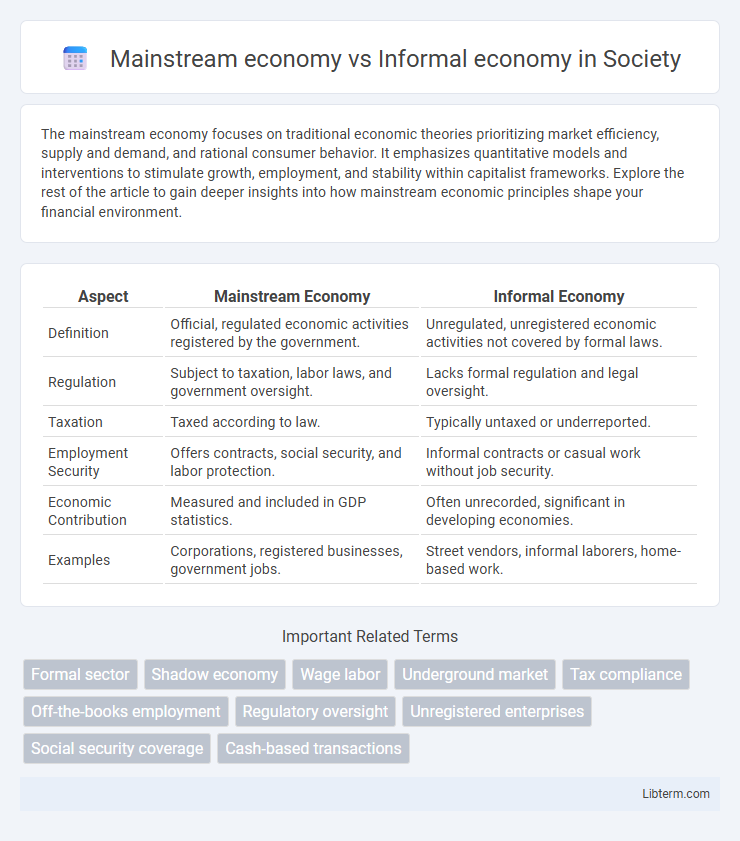The mainstream economy focuses on traditional economic theories prioritizing market efficiency, supply and demand, and rational consumer behavior. It emphasizes quantitative models and interventions to stimulate growth, employment, and stability within capitalist frameworks. Explore the rest of the article to gain deeper insights into how mainstream economic principles shape your financial environment.
Table of Comparison
| Aspect | Mainstream Economy | Informal Economy |
|---|---|---|
| Definition | Official, regulated economic activities registered by the government. | Unregulated, unregistered economic activities not covered by formal laws. |
| Regulation | Subject to taxation, labor laws, and government oversight. | Lacks formal regulation and legal oversight. |
| Taxation | Taxed according to law. | Typically untaxed or underreported. |
| Employment Security | Offers contracts, social security, and labor protection. | Informal contracts or casual work without job security. |
| Economic Contribution | Measured and included in GDP statistics. | Often unrecorded, significant in developing economies. |
| Examples | Corporations, registered businesses, government jobs. | Street vendors, informal laborers, home-based work. |
Understanding Mainstream and Informal Economies
Mainstream economies operate within formal systems governed by regulations, taxation, and official financial institutions, driving national GDP and employment statistics. Informal economies consist of unregulated, untaxed activities often overlooked in official data, sustaining livelihoods through small-scale trade, services, and barter. Understanding the distinction clarifies the economic contributions and challenges within a society, highlighting the importance of integrating informal sectors for inclusive growth.
Defining Characteristics of Both Economies
The mainstream economy is characterized by formal structures, regulated markets, official employment, and taxable transactions governed by legal frameworks and monetary policies. The informal economy operates outside formal regulations, often involving unregistered businesses, cash-based or barter transactions, and lacks social security or labor protections. Both economies coexist, with the informal sector providing income and employment where formal systems are inaccessible or inadequate.
Historical Evolution of Economic Sectors
The historical evolution of economic sectors reveals that the mainstream economy developed through formal institutions, regulated markets, and structured labor systems, primarily emerging during the Industrial Revolution. In contrast, the informal economy has existed throughout human history, characterized by unregulated, small-scale, and often subsistence activities that operate outside formal legal frameworks. Over time, the mainstream economy expanded with urbanization and industrialization, while the informal economy persisted and adapted, especially in developing regions where formal employment opportunities remained limited.
Major Players in Mainstream vs Informal Markets
The mainstream economy is dominated by major players such as multinational corporations, large financial institutions, and government regulators that operate within formal legal frameworks and established market structures. Conversely, the informal economy is characterized by small-scale entrepreneurs, street vendors, unregistered laborers, and local service providers who operate outside formal regulatory systems, often relying on cash transactions and informal networks. The stark contrast in scale and regulatory oversight between these sectors significantly impacts taxation, labor rights, and economic data accuracy.
Income Generation and Wealth Distribution
Mainstream economy generates income primarily through formal employment, business activities, and regulated markets, often resulting in more predictable wealth distribution supported by taxation and social policies. Informal economy income arises from unregulated, cash-based work such as street vending and casual labor, leading to irregular earnings and limited access to social security, which exacerbates wealth inequality. The wealth distribution in the informal sector remains highly uneven due to lack of formal financial services and government support, contrasting with the structured redistribution mechanisms in the mainstream economy.
Legal Frameworks and Regulatory Oversight
The mainstream economy operates within established legal frameworks and regulatory oversight, ensuring businesses comply with tax laws, labor standards, and financial reporting requirements. In contrast, the informal economy functions outside formal regulations, often lacking contracts, social protections, and official recognition, which limits access to legal rights and social security benefits. This disparity affects economic data accuracy, tax revenue collection, and the effectiveness of economic policies aimed at inclusive growth.
Impact on Employment and Labor Markets
The mainstream economy, characterized by formal employment with regulated labor markets, provides job security, benefits, and legal protections, contributing to stable wage growth and social insurance coverage. In contrast, the informal economy operates without formal contracts or regulations, offering flexible but often precarious employment lacking social security, resulting in underreported work and limited workers' rights. This duality influences overall labor market dynamics by creating segmented employment conditions that challenge comprehensive labor policy implementation and social welfare systems.
Economic Contributions and GDP Implications
The mainstream economy significantly contributes to GDP through formal sectors such as manufacturing, services, and trade, which are systematically recorded in national accounts and benefit from regulations and taxation. In contrast, the informal economy includes unregistered activities like street vending, home-based work, and small-scale agriculture, which generate substantial income but often remain invisible in official GDP statistics. Recognizing the informal economy's economic contributions is crucial for policymakers to create inclusive strategies that enhance overall economic growth and social welfare.
Social Perceptions and Challenges
The mainstream economy, characterized by regulated markets and formal employment, often enjoys greater social legitimacy and institutional support compared to the informal economy, which operates outside official regulatory frameworks. Social perceptions frequently stigmatize informal economic activities as unstable or illegal, despite their critical role in providing livelihoods for marginalized populations and fostering grassroots entrepreneurship. Challenges faced by the informal economy include limited access to social protections, financial services, and legal recognition, which exacerbate economic vulnerability and hinder upward mobility.
Pathways Toward Integration and Formalization
Pathways toward integration and formalization of the informal economy involve regulatory reforms that simplify business registration and tax compliance, enhancing economic inclusion and boosting government revenues. Targeted support programs, such as access to credit, training, and social protection, empower informal workers to transition into the mainstream economy, fostering sustainable livelihood improvements. Digital platforms and mobile technology facilitate formalization by reducing transaction costs and increasing transparency, accelerating the convergence of informal activities into formal economic structures.
Mainstream economy Infographic

 libterm.com
libterm.com